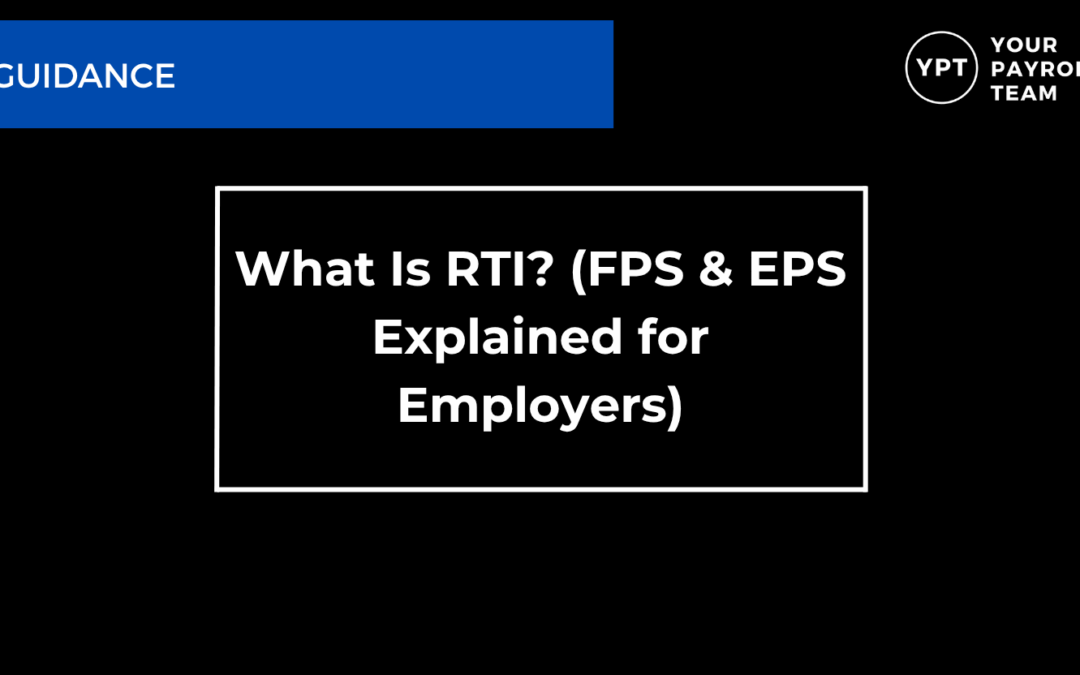RTI — Real Time Information — is the system that employers use to report payroll information to HMRC every time employees are paid.
It’s one of the most important parts of UK payroll, and late or incorrect submissions can lead to penalties.
This guide explains RTI in simple terms so you understand what it is, how it works, and what you must do as an employer.
What Is RTI?
RTI stands for Real Time Information.
It’s the process of sending payroll data to HMRC on or before the day employees are paid.
RTI tells HMRC:
-
How much each employee has been paid
-
What tax and National Insurance has been deducted
-
Whether statutory payments have been made
-
Whether the employer has made any recoveries or adjustments
-
How much PAYE/NIC the employer owes
Without RTI, HMRC wouldn’t know how much tax or NI an employee should pay.
Why RTI Matters
RTI helps HMRC:
-
Track tax and NI in real time
-
Issue accurate tax codes
-
Prevent over- or under-payments
-
Monitor employer compliance
-
Apply Universal Credit assessments correctly
-
Reduce payroll errors across the country
For employers, RTI is a legal requirement every time payroll is run.
The Two Core RTI Submissions: FPS and EPS
There are two main RTI submissions employers must understand:
-
FPS – Full Payment Submission
-
EPS – Employer Payment Summary
Here’s how they work.
1. FPS (Full Payment Submission)
The FPS is the most important RTI submission.
You must send an FPS on or before each payday, including:
-
Pay date
-
Gross pay
-
Tax deducted
-
Employee National Insurance
-
Employer National Insurance
-
Student loans/postgraduate loans
-
Statutory payments (SSP, SMP, SPP, SAP, ShPP)
-
Starter or leaver details
-
Tax codes
-
Hours worked (A–D bands)
-
Any adjustments affecting PAYE/NIC
When do you send the FPS?
Every single pay period — monthly, weekly or otherwise.
What happens if you send it late?
HMRC may apply late filing penalties unless there is a reasonable excuse.
2. EPS (Employer Payment Summary)
The EPS is used when there is something to report that wasn’t included in the FPS.
Examples include:
-
Recovering statutory payments (e.g., SMP reclaim)
-
No payments made in a period
-
Claiming Employment Allowance
-
CIS deductions suffered (for construction businesses)
-
Apprenticeship Levy adjustments
-
NIC holiday schemes (when applicable)
When do you send the EPS?
Usually after the FPS, but always by the 19th of the following month for it to affect PAYE owed that month.
Other RTI Submissions (Less Frequent)
These include:
-
Earlier Year Updates (EYUs) – used historically to fix prior year errors (now replaced by corrected FPS/EPS)
-
Final FPS of the year – includes the “final submission” indicator
-
P11D(b) – not technically RTI, but part of the wider reporting requirements
Modern payroll systems handle most of these automatically.
Employer Responsibilities Under RTI
As an employer, you must:
-
Send an FPS on or before payday
-
Submit EPS forms when required
-
Keep accurate payroll records
-
Apply the correct tax codes
-
Correct errors promptly
-
Pay PAYE/NIC to HMRC on time
-
Issue payslips, P45s and P60s correctly
Outsourcing payroll does not remove these obligations — but it greatly reduces the risk of errors or late submissions.
Common RTI Mistakes
Employers often encounter issues with:
Late FPS submissions
Usually caused by missing deadlines, missing data, or payroll being run too late.
Incorrect employee details
Wrong NI numbers, dates of birth or start dates cause downstream issues.
Not submitting an EPS when required
This can mean you pay too much PAYE or miss recoveries.
Wrong pay dates
RTI must use the actual contractual pay date — not the date you process payroll.
Incorrect handling of starters and leavers
Missing P45 details or failing to report a leaving date can cause incorrect tax.
Not correcting errors properly
HMRC requires corrected FPS/EPS submissions — not manual adjustments.
What Happens If You File RTI Late?
HMRC may issue:
-
Late filing penalties
-
Interest on late-paid PAYE
-
Compliance checks
-
Requests for explanation
-
Penalties for repeated failures
Consistent lateness can signal poor payroll controls.
How We Help Employers with RTI Compliance
Your Payroll Team can support you with:
-
RTI submissions (FPS & EPS)
-
PAYE and NI accuracy checks
-
Correcting historic RTI issues
-
Handling HMRC queries
-
Ensuring compliance during system changes or staff sickness
-
Full outsourced payroll services
Talk to a Payroll Specialist About RTI
FAQ: RTI Explained
Do I have to send an FPS even if no one is paid?
If no employees are paid in a period, you submit an EPS instead to inform HMRC.
Can RTI be corrected?
Yes — using a corrected FPS or EPS. You do not need to wait for the next year.
What happens if I miss the deadline?
You may receive a penalty. HMRC sometimes shows leniency for first offences.
Is RTI the same as PAYE?
No. PAYE is the system that collects tax/NIC. RTI is how you report that information.

